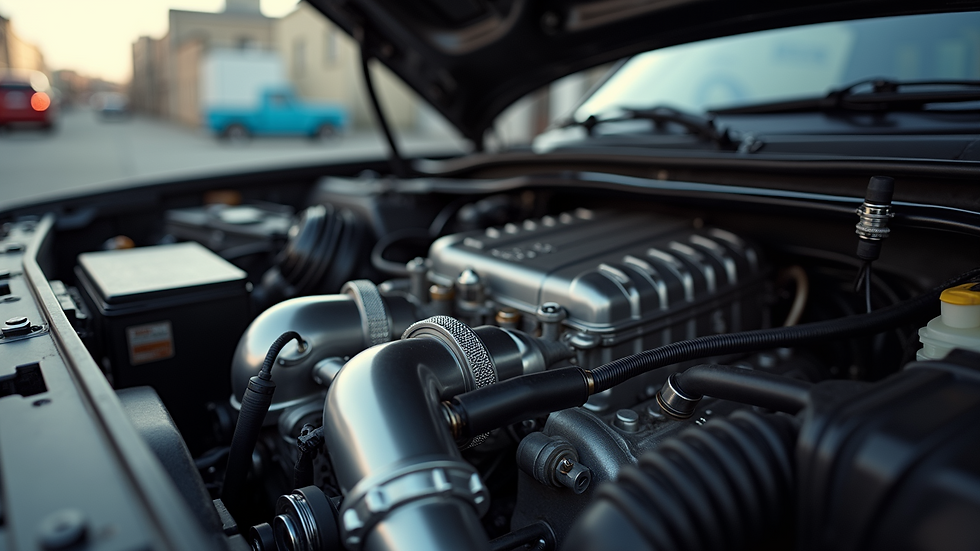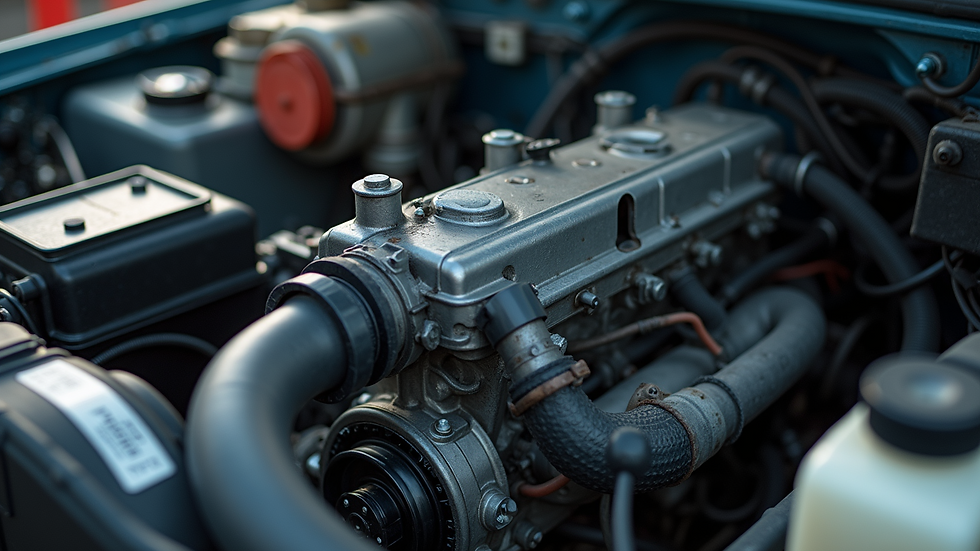Top Tips for Maximizing Fuel Efficiency in Diesel Vehicles
- Price Robinson
- Jul 26
- 4 min read
Diesel vehicles are known for their power and durability. However, they can also be fuel-efficient if you know how to optimize their performance. Whether you drive a truck, SUV, or sedan, there are several strategies you can implement to get the most out of every drop of diesel. In this post, we will explore practical tips that can help you maximize fuel efficiency in your diesel vehicle.
Understand Your Vehicle
Before you can improve fuel efficiency, it is essential to understand your vehicle. Each diesel engine has its own specifications and requirements.
Read the Owner's Manual: This document contains valuable information about your vehicle's fuel requirements and maintenance schedules.
Know Your Engine Type: Different diesel engines have different fuel efficiency ratings. Familiarize yourself with your engine's capabilities.
By understanding your vehicle, you can make informed decisions that enhance its performance.
Regular Maintenance is Key
Regular maintenance is crucial for keeping your diesel vehicle running efficiently.
Oil Changes: Change the oil as recommended by the manufacturer. Clean oil reduces friction and helps the engine run smoothly.
Air Filters: Replace air filters regularly. A clean air filter allows for better airflow, which can improve fuel efficiency.
Fuel Filters: Dirty fuel filters can restrict fuel flow. Replace them as needed to ensure optimal performance.
By staying on top of maintenance, you can prevent issues that may lead to decreased fuel efficiency.
Drive Smart
Your driving habits play a significant role in fuel efficiency.
Smooth Acceleration and Braking: Avoid rapid acceleration and hard braking. Smooth driving can improve fuel economy.
Maintain a Steady Speed: Use cruise control on highways to maintain a constant speed. This can help save fuel.
Limit Idling: Turn off the engine if you expect to be stopped for more than a minute. Idling consumes fuel without moving the vehicle.
By adopting smarter driving habits, you can significantly enhance your vehicle's fuel efficiency.
Optimize Your Load
The weight of your vehicle can impact fuel efficiency.
Remove Unnecessary Items: Clear out any items you do not need. Extra weight can decrease fuel economy.
Use Roof Racks Wisely: If you use a roof rack, remove it when not in use. Roof racks can create drag, which reduces fuel efficiency.
Distribute Weight Evenly: If you are carrying a load, distribute it evenly. This can help maintain balance and improve fuel efficiency.
By optimizing your load, you can reduce the strain on your engine and improve fuel economy.
Choose the Right Fuel
Not all diesel fuels are created equal.
Use High-Quality Diesel: Choose a reputable fuel supplier. High-quality diesel can improve engine performance and fuel efficiency.
Consider Additives: Some fuel additives can enhance fuel efficiency. Research and choose products that are compatible with your vehicle.
Avoid Biodiesel Blends: If your vehicle is not designed for biodiesel, avoid using it. It can affect engine performance and fuel efficiency.
By selecting the right fuel, you can ensure your engine runs efficiently.
Monitor Tire Pressure
Tire pressure is often overlooked but plays a crucial role in fuel efficiency.
Check Tire Pressure Regularly: Under-inflated tires can increase rolling resistance, leading to decreased fuel economy.
Follow Manufacturer Recommendations: Use the recommended tire pressure listed in your owner's manual or on the driver's side door.
Rotate Tires: Regularly rotating your tires can ensure even wear and improve fuel efficiency.
By keeping your tires properly inflated and maintained, you can enhance your vehicle's performance.
Limit Air Conditioning Use
Air conditioning can significantly impact fuel efficiency.
Use AC Sparingly: Try to limit the use of air conditioning, especially at lower speeds.
Ventilate Before AC: Open windows to cool down the vehicle before turning on the AC.
Use Recirculation Mode: When using AC, switch to recirculation mode to reduce the load on the engine.
By managing your air conditioning use, you can save fuel and improve efficiency.
Plan Your Routes
Planning your routes can help you save fuel.
Avoid Traffic: Use apps to check traffic conditions and avoid congested areas.
Combine Errands: Try to combine multiple errands into one trip. This reduces the number of short trips, which can be less fuel-efficient.
Use GPS: A GPS can help you find the most efficient routes, saving both time and fuel.
By planning your routes wisely, you can minimize fuel consumption.
Keep Your Vehicle Clean
A clean vehicle is not just about aesthetics; it can also improve fuel efficiency.
Wash Regularly: Dirt and grime can create drag, which can reduce fuel efficiency.
Clean Windows and Mirrors: Ensure that windows and mirrors are clean for better visibility and aerodynamics.
Maintain the Undercarriage: A clean undercarriage can help improve airflow and reduce drag.
By keeping your vehicle clean, you can enhance its performance and efficiency.
Invest in Technology
Modern technology can help you maximize fuel efficiency.
Fuel Economy Monitors: Consider installing a fuel economy monitor. These devices can provide real-time feedback on your driving habits.
Eco-Driving Apps: Use apps that track your driving habits and suggest improvements for better fuel efficiency.
Telematics Systems: If you have a fleet of diesel vehicles, consider telematics systems to monitor fuel consumption and optimize routes.
By investing in technology, you can gain insights that help improve fuel efficiency.
Educate Yourself
Staying informed about fuel efficiency can help you make better choices.
Read Articles and Blogs: Follow reputable sources that provide tips and updates on fuel efficiency.
Join Online Forums: Engage with other diesel vehicle owners to share experiences and tips.
Attend Workshops: Look for local workshops or seminars on vehicle maintenance and fuel efficiency.
By educating yourself, you can stay ahead of the curve and make informed decisions.
Conclusion: Fuel Efficiency is Within Reach
Maximizing fuel efficiency in diesel vehicles is achievable with the right strategies. By understanding your vehicle, maintaining it regularly, and adopting smart driving habits, you can significantly improve fuel economy.
Remember, every small change can lead to better fuel efficiency. Whether you are a daily commuter or a long-haul driver, these tips can help you save money and reduce your environmental impact.
Start implementing these strategies today, and watch your fuel efficiency soar.



Comments